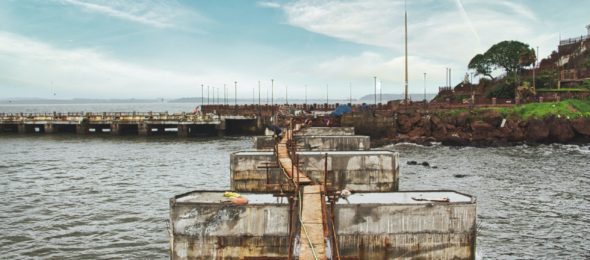South Asian Water Imaginaries in an Era of Environmental Crisis
A graduate student workshop
Friday, October 13, 2023
Concept Note & CFP
Anthropogenic activities in an increasingly technocratic, industrialized, and capitalist world are posing serious threats to earth systems and their bio-geological processes and entities. When it comes to the environmental crises, South Asia—occupying only 3.4 percent of the world’s land area but carrying about 24 percent of the world’s population—is one of the most vulnerable regions in the world. The World Bank’s Climate Change Knowledge Portal and the IMF Climate Change Dashboard confirm that South Asia is particularly vulnerable to water-borne catastrophes. The region is surrounded by three large water bodies—the Bay of Bengal, the Indian Ocean, and the Arabian Sea—and numerous rivers and their tributaries, and is characterized in many places by tropical monsoons and a wet climate. Sea-level rise, changes in weather patterns, erratic rainfall, and groundwater depletion lead to extreme climate events such as floods, drought, and more intense cyclonic storms. These water-related risks get aggravated due to high levels of poverty and inequalities in South Asian societies (Amrith 4). Consequently, communities in this region are highly susceptible to multiple environmental challenges, such as food insecurity, water-induced displacements, livelihood crises due to economic losses in fishing, agriculture, and tourism, and negative impact on human health and well-being.
These vulnerabilities and the resilience which have been emerging against them have been finding articulation in South Asian literary culture. With its unique capacity of representing the subjective, personal, and emotive, literature addresses the massive scale and abstract nature of climate change as theorized in statistical data and scientific models. Narrative as a means of making sense of the world is potent in becoming an instrument for rethinking our mutual dependence and interaction with environmental agency and nonhuman others. In today’s context of pervasive environmental crises and climate change, stories “shape how we prepare for, respond to, and recover from increasingly frequent and…unfamiliar forms of eco-catastrophe” (Rigby 2).
Literary texts from South Asia have of late begun to display an acute awareness of this environmental crisis and the manifold cultural and economic impact it is having on the region. Such texts may be considered as gateways to vicariously access the environmental challenges that South Asia is exposed to: many of them “respond to water’s material complexity and imaginative polyphony” (Mentz 193) in delineating the roots and repercussions of this crisis. Kamila Shamsie’s City by the Sea (1998) narrates the state of appalling pollution in Karachi, situated along the Arabian coast, emphasizing human-ocean entanglement and co-becoming. Amitav Ghosh in The Hungry Tide (2004) and in its sequel Gun Island (2019) foregrounds the vulnerability of the Bay of Bengal region as evident in the issues of climate-migration and the complexities of conservation projects through recurrent diluvian imageries. Similarly, Sonali Deraniyagala in Wave (2013) recounts the 2004 Indian Ocean earthquake and tsunami to embark upon an affective retelling of post-tsunami loss, grief, and trauma.
Taking cue from these texts, this workshop aims to trace the presence of water in South Asian literature as an indispensable environmental actant continuously shaping its possibilities and perils. This workshop will be held in-person at our campus in Bhilai, Chhattisgarh. Our aim is to provide participating scholars an opportunity to be mentored by experts in the field and discover zones of confluence with peers and mentors alike. The workshop is being conceived as an outcome oriented platform which will seek to collaboratively reflect upon a set of chosen thematics as emergent from and reflected in literary texts. The following in the context of South Asia may be taken as indicative of our interests for this workshop:
Action/narration: storytelling as an agent of change
Colonialism, nationalism, globalism: conjunctions
Environmental justice: precarity and resilience
Climate change: risk, disaster, displacement
Urbanity, waste, and (un)sustainability
Women, gender and environmental precarity
To facilitate greater interaction between mentors and mentees, the workshop will consist of three sessions of an hour and a half each. Each session will be framed by a thematic concern and have three participants and one mentor. Participants will give a presentation of strictly ten minutes each, after which discussion will be steered by the mentor towards addressing the shared set of research questions and developing a potential outcome in the form of a jointly-authored case study, research paper, report, or review article.
Abstracts of no more than 500 words along with short bio-notes of not more than 50 words should be submitted to dept_la@iitbhilai.ac.in by July 15, 2023. The organizing committee will intimate its decision by August 1, 2023. Selected participants will be required to submit working drafts of their papers in the vicinity of 3,000 words by September 15, 2023; failure to do so may lead to withdrawal of invitation to participate in the workshop. Selected participants will be provided accommodation and meals for the duration of their stay at IIT Bhilai. While there will be no registration fee to participate in the workshop, unfortunately, we are unable to cover travel costs for participants.
Organizing Committee:
Dr Anubhav Pradhan, Assistant Professor, Department of Liberal Arts, IIT Bhilai
Ms Barsha Santra, Doctoral Scholar, Department of Liberal Arts, IIT Bhilai
Works Cited
Amrith, Sunil S. Unruly Waters: How Mountain Rivers and Monsoons Have Shaped South Asia’s History. Penguin Books, 2020.
Chakrabarty, Dipesh. “The Climate of History: Four Theses.” Critical Inquiry, vol. 35, no. 2, Jan. 2009, pp. 197–222, https://doi.org/10.1086/596640
Ghosh, Amitav. The Great Derangement: Climate Change and the Unthinkable. The University of Chicago Press, 2017.
Mentz, Steve. “Ice/Water/Vapor.” The Cambridge Companion to Environmental Humanities, 2 Sept. 2021, pp. 185–198, https://doi.org/10.1017/
Rigby, Catherine E. Dancing with Disaster: Environmental Histories, Narratives, and Ethics for Perilous Times. Univ. of Virginia Press, 2015.
Trexler, Adam. Anthropocene Fictions: The Novel in a Time of Climate Change. University of Virginia Press, 2015.
Barsha Santra
Doctoral Scholar
Department of Liberal Arts, IIT Bhilai








